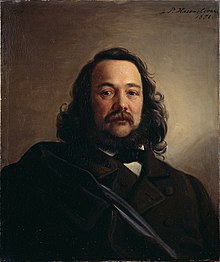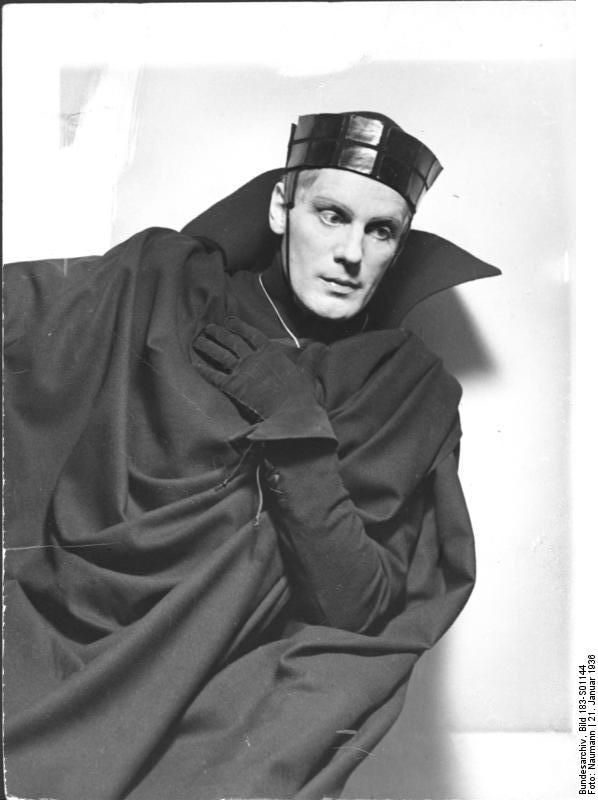 |
| Ferdinand Freilgrath |
Ferdinand Freiligrath
Deutschland ist Hamlet! Ernst und stumm Germany is Hamlet! Serious and Silent
In seinen Toren jede Nacht Buried Freedom wanders about his gates
Geht die begrabne Freiheit um Every night and waves at the men of the Watch.
Und winkt den Männern auf der Wacht. There stands the High One, openly armed
Dasteht die Hohe, blank bewehrt, And says to the procrastinator, who still doubts,
Und sagt dem zaudrer, der noch zweifelt: "Be for me a Revenger, Draw your sword!
"Sei mir ein Rächer, zieh dein Schwert! They have trickled poison into my ear!"
Man hat mir Gift ins Ohr geträufelt!"
Er horcht mit zitterndem Gebein, He obeys with trembling bones
Bis ihm die Wahrheit schrecklich tagt; Until the Truth becomes awfully clear to him
Von Stund' an will er Rächer sein - From this hour he will become a Revenger -
Ob er es wirklich endlich wagt? Whether he will actually finally dare?
Er sinnt und träumt und weiß nicht Rat; He thinks and dreams and knows not the Council;
Kein Mittel, das die Brust ihm stähle! No means which will steel his breast!
Zu einer frischen, mut'gen Tat To a fresh, courageous Act
Fehlt ihm die frische, mut'ge Seele! He lacks the fresh, courageous Soul!
Das macht, er hat zu viel gehockt; That makes, he has cowered too much;
Er lag und las zu viel im Bett. He lay and read too much in bed.
Er wurde, weil das Blut ihm stockt, He became too short of breath and too fat
Zu kurz von Atem und zu fett. Because the blood stopped in his veins.
Er spann zu viel gelehrten Werg, He spun too much scholarly Stuff,
Sein bestes Tun ist eben Denken; His best action is only his thinking;
Er stak zu lang in Wittenberg, He stayed too long in Wittenberg,
Im Hörsaal oder in den Schenken. In the Lecture Hall or in the Bars.
Drum fehlt ihm die Entschlossenheit; Therefore, he lacks the Determination
Kommt Zeit, kommt Rat - er stellt sich toll, Time comes, Counsel comes - He pretends to madness,
Hält Monologe lang und breit, Holds monologues long and wide,
Und biringt in Verse Groll; And covers (rings around) Anger in verse;
Stutzt ihn zur Pantomime zu, And he tumbles (or stumbles) to Pantomime,
Und fällt's ihm einmal ein zu fechten: And suddenly the idea occurs to him to fence:
So muß Polonius-Kotzebue So Polonius - Kotzebue
Den Stich empfangen - statt des Rechten. Receives the blow - instead of the Right one.
(Kotzebue was a poet who was killed by a member of a militant student society for writing against nationalism)
So trägt er träumerisch sein Weh, So he bears his Woe so dreamily,
Verhöhnt sich selber insgeheim, Secretly mocking himself,
Läßt sich verschicken über See, Allows himself to be sent oversea,
Und kehrt mit Stichelreden heim; And returns home with taunts and jests;
Verschießt ein Arsenal von Spott, And misses an arsenal of mockery,
Spricht von geflickten Lumpenkön'gen - Speaks of a patchwork, rag-King -
Doch eine Tat! Behüte Gott! But Action! God forbid!
Nie hatt' er eine zu beschön'gen! Never had he one (action) that he needed to excuse!
Bis endlich er die Klinge packt, Until finally he grabs the blade,
Ernst zu erfüllen seinen Schwur; Soberly, to fulfill his Oath;
Doch ach - das ist im letzten Akt But Oh - that is in the last act
Und streckt ihn selbst zu Boden nur! And he only falls to the ground himself!
Bei den Erschlagnen, die sein Haß Among the slain, who his hatred
Preisgab der Schmach und dem Verderben, Surrendered the shame and the ruin,
Liegt er entseelt, und Fortinbras He lies lifeless (literally unsouled), and Fortibras
Rückt klirrend ein, das Reich zu erben. - Enters clanking in, to inherit the Kingdom. -
Gottlob! noch sind wir nicht so weit! Praise God! We are not yet that far!
Vier Akte sahn wir spielen erst! Four acts only have we seen played!
Hab' acht, Held, daß die Ähnlichkeit Look out, Hero, that the similarities
Nicht auch im fünften du bewährst! Don't also continue into the Fifth!
Wir hoffen früh, wir hoffen spät: We hope early, we hope late:
O, raff' dich auf und komm zu Streiche, O, brace yourself and come to Jests,
Und hilf entschlossen, weil es geht, And help decide, because it goes
Zu ihrem Recht der flehnden Leiche! To the rights of the imploring corpses!
Mach' den Moment zunutze dir! Make the Moment of use to you!
Noch ist es Zeit - drein mit dem Schwert, Now is the time -- In with your sword,
Eh' mit französischem Rapier Before, with French Rapier,
Dich schnöd vergiftet ein Laert! A Laertes despicably poisons you!
Eh' rasselnd naht ein nordisch Heer, Before a northern army rattles near,
Daß es für sich die Erbschaft nehme! And takes your inheritance for itself!
O, sieh dich vor - ich zweifle sehr, O, watch yourself -- I doubt much,
Ob diesmal es aus Norweg käme! If this time, help will come from Norway!
Nur ein Entschluß! Aufsteht die Bahn - Just a decision! The path goes on -
Tritt in die Schranken kühn und dreist! Step in (across) the barriers, bold and brazen!
Denk' an den Schwur, den du getan, Think on the Oath, that you have sworn
Und räche deines Vaters Geist! And revenge your Father's ghost!
Wozu dieses Grübeln für und für? Why this pondering, over and over?
Doch - darf ich schelten, alter Träumer? But -- may I scold, old dreamer?
Bin ich ha selbst ein Stück von dir, Am I not also a part of you,
Du ew'ger Zauderer und Säumer! You eternal procrastinator and hesitator!
St. Goar, April 1844. St. Goar, April 1844
What I find interesting about this is when it is written: 1844. At that time there was no Germany, not as we understand it today. There was no single, unified government, there were several German States, like Prussia, Saxony, Hessia, and Westfalia. So, to me, part of this poem is asking Germans, everywhere, to stand up, to stand together. The mid 1800s was a great time in European history for nation building, national borders were being defined, people who spoke a common language, had a common culture and history were banding together and Freiligrath seems to be saying, "Why can't we, as Germans, do the same?"
 |
| One of the most famous German Hamlets, Gustaf Gründgens, 1936 |
The 17 and 1800s were also a great time for German thinkers, philosophers, poets, and authors: Goethe, Schiller, Kant, Nietzsche, Schlegel were developing their ideas, writing, thinking, founding academies and universities. At this time it seems that Germans would much rather "lay and read in bed" and that their "greatest action is thinking". Thus, as one reads and studies Hamlet, one can definitely see a similarity between the culture of Germany and the character of Hamlet.
Germany of the 1800s was very much torn between philosophy and action. Along with the great thinkers already mentioned, there were great military leaders, such as Otto von Bismarck (North Dakota is the only US State to have a capital named after a non-US citizen! I was also born there, in Grand Forks, ND) who helped make Prussia one of the largest and strongest of the German states, unifying Germany into the Second Reich (the Second great German Empire).
Doesn't that sound like Hamlet? On the one hand he is compelled by his father's ghost to action, to revenge, but on the other, he is a scholar (he did recently come from the Univerisity of Wittenberg, in Germany!) and he would much rather read and think and ponder, than rashly murder the king, his uncle.